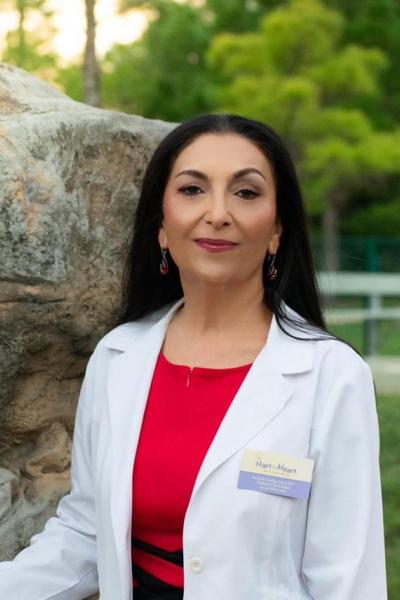Dr. Noushin Izadifar Hart
Dr. Noushin Izadifar Hart is a distinguished Board Certified Radiation Oncologist whose passion lies in the realms of trauma-informed oncology and adopting a holistic approach to the prevention and treatment of cancer.
Hart's journey in the field of medicine began in 1986 when she completed her medical education in Iran. As a dedicated general practitioner, she honed her medical skills over several years before relocating to the United States in 1994, where she has since called home for over three decades.
Her pursuit of excellence led her to undertake a rigorous year of internship at the Medical College of Pennsylvania in Philadelphia. Subsequently, she embarked on her residency in radiation oncology at the prestigious Mallinckrodt Institute of Radiology at Washington University in St. Louis. During her time there, she also devoted a year to groundbreaking research, investigating the advantages of Three-Dimensional Conformal Radiation Therapy in the treatment of Head and Neck Cancers.
Following the completion of her residency, Dr. Hart assumed the role of an assistant professor at Loyola University. In this capacity, she served as the chief of breast and GYN (gynecological) and brachytherapy services, pioneering the implementation of High Dose Rate (HDR) brachytherapy for GYN and breast cancer treatment. Furthermore, she oversaw lymphoma and Total Body Irradiation as part of the Bone Marrow Transplantation program and actively participated in national research protocols focusing on endovascular brachytherapy and accelerated partial breast irradiation using the MammoSite breast brachytherapy catheter.
Dr. Hart boasts a wealth of experience, having trained in one of the few residency programs equipped with IMRT (Intensity Modulated Radiation Therapy) technology. Throughout her residency, fellowship, and academic tenure, she has been at the forefront of clinical research in Three Dimensional Conformal Radiation Therapy, Intensity Modulated Radiation Therapy, Endovascular Brachytherapy, and the treatment of gynecological and breast malignancies.
At the heart of Dr. Hart's practice is her unwavering commitment to her patients. She is a staunch advocate for their well-being and places their best interests at the forefront of her care. Dr. Hart's philosophy centers on empowering her patients with the knowledge to dispel the myths surrounding cancer and its treatments. Over the course of her illustrious career, she has pioneered cancer education programs and established invaluable support groups for cancer survivors and their families.
Dr. Hart firmly believes in the synergy of Allopathic Medicine and Complementary treatments, particularly those rooted in Eastern Medicine. She recognizes that while Allopathic Medicine excels in addressing acute conditions, it falls short in the realm of chronic conditions and prevention, where Complementary Medicine plays a pivotal role.
A passionate advocate for the mind-body-spirit approach, Dr. Hart underscores the significant impact of childhood and adulthood traumas in the development of serious and chronic diseases, including cancer. In collaboration with the MAP Coaching Institute, she offers a transformative twelve-week program, the Cancer Relief Trauma Program, designed to heal the emotional scars inflicted by a cancer diagnosis. Moreover, Dr. Hart provides private MAP Method™ sessions aimed at neutralizing the negative emotions associated with childhood traumas.
These diverse experiences have equipped Dr. Hart with a unique perspective on the challenges facing today's healthcare landscape. She serves as a Medical Advisor for Blue Dot, the trailblazing initiative offering free coverage for mental health and wellness. Additionally, she lends her expertise as a specialist for the Regional Intra Health Initiative – Africa, an advocacy group dedicated to identifying and addressing healthcare disparities in Africa.
Above all, Dr. Hart has consistently recognized the pivotal role of preventive measures. Her resolute belief is that for every life saved through cancer treatments, many more can be saved by placing a paramount focus on prevention and early detection.


